- Home
- Barbara Kingsolver
Small Wonder Page 2
Small Wonder Read online
Page 2
Lately we've had to consider a new kind of enemy we can hardly bear to behold: a foul hatred bent to the destruction of all things precious to us--to me; I'll shudder here and speak for myself as someone who loves her life as it is, a woman whose spirit would surely get itself stoned to death if forced to submit to the order of such men. The horrors they've wrought have reduced me at times to a pure grief in which I could only cross my arms against my chest and cry out loud. I can't pretend to understand their aims; I can barely grasp the motives of a person who hits a child, so I surely have no access to the minds of men who could slaughter thousands of innocents and die in the process, or train others to do those things. I presume they want us to become more like themselves: hateful, self-righteous, violent. I expect they would count themselves victorious to see us reduced to panic under their specter, to fall into factions of difference and censor or attack our own minorities, to weaken and let go of the ideals of equality and kindness that first brought our country onto the map of the world. So I hold my own heart fast against the fulfillment of this horrific prophecy, and I hope that the men who constructed it can be made to live out humiliated ends in prison--a punishment that would inspire fewer followers, I think, than dramatic death in battle.
But even that would not be the end of the story. This new enemy is not a person or a place, it isn't a country; it is a pure and fearsome ire as widespread as some raw element like fire. I can't sensibly declare war on fire, or reasonably pretend that it lives in a secret hideout like some comic-book villain, irrationally waiting while my superhero locates it and then drags it out to the thrill of my applause. We try desperately to personify our enemy in this way, and who can blame us? It's all we know how to do. Declaring war on a fragile human body and then driving the breath from it--that is how enmity has been dispatched for all of time, since God was a child and man was even more of one.
But now we are faced with something new: an enemy we can't kill, because it's a widespread anger so much stronger than physical want that its foot soldiers gladly surrender their lives in its service. We who live in this moment are not its cause--instead, a thousand historic hungers blended to create it--but we are its chosen target: We threaten this hatred, and it grows. We smash the human vessels that contain it, and it doubles in volume like a magical liquid poison and pours itself into many more waiting vessels. We kill its leaders, and they swell to the size of martyrs and heroes, inspiring more martyrs and heroes. This terror now requires of us something that most of us haven't considered: how to defuse a lethal enemy through some tactic more effective than simply going at it with the biggest stick at hand.
Something new is upon us, and yet nothing is ever new. Two thousand years ago, the Greeks understood this enemy. It inhabited their imagination in a favorite tale of heroic adversity, the story of Jason and the Argonauts, where it took the shape of a particular dragon. When this creature was slain and its corpse fell to the soil, each of its teeth germinated and instantly grew into a new enemy, fully armed and born full-force to the battle. In all of his picturesque predicaments, Jason never faced one more impossible than this field of foes, each with its own mouthful of teeth aching to germinate. For once he couldn't fight his way out; it took a woman to save him. Medea, who loved Jason and tried to protect him, whispered in his ear a simple truth: Hatred dies only when turned on itself. This force could not be extinguished by the sword, she told him; only a clever psychological strategy could vanquish it. Jason took her advice but went about it in his own way, by throwing a rock cryptically and inciting an internal riot of rock throwing in which the dragon's-tooth warriors destroyed one another.
Later on, Jason encountered another dragon. Unbelievably (but of course, heroes being only what they are, predictably), he again drew his sword, ready to kill it. Medea stopped him with a quick, gentle hand on his bicep. This time, rather than allowing a new field of hatred to be sown and reaped, she moved quietly to the mouth of the sleeping dragon and gave it an elixir of contentment so it would remain asleep as she and her lover passed by.
At a time when the modern imagination seems fully engaged in discussion of swords of every length and breadth, there's little room for other kinds of talk. But I'm emboldened by Medea to speak up on behalf of psychological strategy. It's not a simple-minded suggestion; her elixir of contentment is exactly as symbolic as Jason's all-conquering sword, and the latter has by no means translated well into reality. The strategic difference is the capacity to understand this one thing: Some forms of enemy are made more deadly by killing. It would require the deepest possible shift of our hearts to live in this world of fundamental animosity and devote ourselves not to the escalating exertion to kill, but rather, to lulling animosity to sleep. Modern humanity may not be up to the challenge. Modern humanity may not have a choice.
The miracle of Lorestan Province haunts me as I consider this predicament. I catch glimpses of that bear pacing restlessly on the periphery of everything I thought I could be sure of. We are alive in a fearsome time, and we have been given new things to fear. We've been delivered huge blows but also huge opportunities to reinforce or reinvent our will, depending on where we look for honor and how we name our enemies. The easiest thing is to think of returning the blows. But there are other things we must think about as well, other dangers we face. A careless way of sauntering across the earth and breaking open its treasures, a terrible dependency on sucking out the world's best juices for ourselves--these may also be our enemies. The changes we dread most may contain our salvation. And the stinging truth that we aren't entirely loved for our ways in this world? Like the bear, this thing could eat us up or save us. We will see.
There are many angles on the miracle in Lorestan: for one, that a bear was in the cave at all. Bears are scarce in the world now, relative to their numbers in times of old; they're a rare sight even in the wildest mountains of Iran. They have been hunted out and nearly erased from the mountains and forests of Europe, much of North America, and other places that have been inhabited for thousands of years by humans, who by and large find it difficult to leave large predators alive. Bears and wolves are our fairy-tale archenemies, and in these tales we teach our children only, and always, to kill them, rather than to tiptoe past and let them sleep. Maybe that's why I'm comforted by the image of a small child curled in the embrace of a mother bear. We need new bear and wolf tales for our times, since so many of our old ones seem to be doing us no good. Now we're finding that it takes our every effort of will and imagination to pull back, to stop in our tracks as hunter and hunted, to halt our habit of killing, before every kind of life we know arrives at the brink of extinction.
Some days you have to work hard to save the bear. Some days the bear will save you.
Something there is that doesn't love a wall,
That sends the frozen-ground-swell under it
And spills the upper boulders in the sun....
In his poem "Mending Wall," Robert Frost invokes the image of his neighbor walking the fence line intent on constant survey and repair, here and there raising up a boulder between his hands, "like an old-stone savage armed," to put it back in its place, determined to keep this boundary intact, though it restrains only trees. (My apple trees will never get across / And eat the cones under his pines, I tell him.) "Good fences make good neighbors," is the only rationale the neighbor will offer, as his father said before him. The poet is baffled at so much resolute effort.
And so we all might well feel baffled, as we awaken this morning to find the greatest part of our ways and means invested in the walls our nations have built between ourselves and those whom we wish to keep out. Throughout our modern history we have taken each step in the construction of defensive borders with few doubts in mind, from stones to bricks and mortar, to rifles and barbed wire, to missiles and tanks and the firestorm contained in an atom. And now here we are, devoted to the efforts of surveillance, repair, and dread.
Borders crumble; they won't hold together on their own;
we have to shore them up constantly. They are fortified and patrolled by armed guards, these fences that divide a party of elegant diners on one side from the children on the other whose thin legs curve like wishbones, whose large eyes peer through the barbed wire at so much food--there is no wall high enough to make good in such a neighborhood. For this, of course, is what the fences divide. Probably we began with more theoretical notions of ethnic purity--the wish to keep the apples out of our pines--and for most of the last century we rationalized our walls in terms of ideology, but the Iron Curtain has now dramatically fallen. Now we have fashioned from the crumbling boundaries of the Cold War a whole new shape of division, fundamentally between rich and poor. That chasm keeps growing; a quarter of the world's poor are now poorer than they were fifteen years ago, having struggled only to lose ground.
The hard boundary between the haves and the have-nots is still defended with armaments, but now it is also bridged by a dancing, illusory world of material wants. Passing through every wall are electronic beams that create a shadow play of desire staged by the puppeteers of globalized commerce, who fund their advertising each year with more than a hundred dollars spent for this planet's every man, woman, child. "This world of inequality is also a world of solitude," writes Eduardo Galeano, in which multitudes of the desperate are led "to confuse being with having." And condemned to have not.
In the name of God and all the fishes, a hundred dollars for every human alive, solely to lure them all into want! To consider this material tyranny is to begin, surely, to understand why protest against the global corporate order throws itself down weeping in the streets from Seattle to Genoa to Pakistan. Imagine how it looks from the other side, where undulating female bodies sell soft drinks to the likes of the nomads in Lorestan Province. This omnipresent shadow play ignores the genuine differences of culture that legitimately distinguish us, pretending instead that we are all of one mind and share in an equal and endless pocketbook. But in truth, it relies on other kinds of fences, ever-increasing fortifications of the heart and treasury. Global commerce is driven by a single conviction: the inalienable right to earn profit, regardless of any human cost. No one argues that this is untrue. It is also proving unassailable. When Guatemala passed laws intended to encourage low-income mothers to breast-feed rather than use imported infant foods, for instance, the world's largest baby-food manufacturer circumvented these rules by threatening to invoke GATT and other trade sanctions. When Europeans favored importing bananas from the Caribbean and Canary Islands over buying fruit grown where working conditions are worse, they were similarly thwarted. The laws governing international trade render it more difficult each year to inject moral considerations into the marketplace, frustrating the many nations and individuals who still wish to balance economic motives with compassionate ones. Indeed, international trade laws increasingly restrict access to the very information that makes any such concession possible--witness, for example, the endless battle for accurate labeling waged by U.S. consumers who prefer their food organically grown and not genetically modified. The profiteering drive of commerce owns no malice or mercy, is incapable of regret, and takes no prisoners; it is simply an engine with no objective but to feed itself. And it is a Goliath: A decade ago, the combined sales of the world's ten largest corporations exceeded the gross national product of the world's hundred smallest countries put together, and the gap is growing.
Inevitably, hungry souls and angry hands rise up against that amoral giant, and ever-higher walls of armaments are required to keep them at bay. These walls create among us a huge class that the French author Jacques Attali has named the "millennial losers," for whom the fantasy of prosperity promoted by the media is both a continuous allure and an endless slapdown. The siren's song calls them toward Paris and New York, glittering Emerald Cities walled off by inaccessibility. In his 1991 book Millennium: Winners and Losers in the Coming World Order, Attali observed with a chilling prescience that particularly among those in the Middle East who'd suffered repeated humiliations by the West, the fiercely absent presence of worldly affluence tended to inspire fervent cults of frustration and outrage.
Something there is that doesn't love a wall,
That wants it down....
We who are alive in this moment didn't build these walls, nor did we ignite the fury that has smoldered for eons and hurls itself at us now as a burning question. But we have inherited the urgent necessity of answering it. And possibly we will succeed.
It isn't only the insane rage of the dispossessed that burns against these walls. It is also, from inside the house of privilege, the indignation of the children of mercy who laid themselves down in the streets of Seattle to bring the World Trade Organization's autocracy to a halt. It is the shaken hearts of those who gathered at Ground Zero in Manhattan and begged for an end to the killing fields. It is surely every person's animal soul, and the DNA code shared perfectly between every two humans alive--a genetic truth inside our cells that leaps back and forth across continents. That code insists on my kinship with both the elegant diner and the child with the wishbone legs, with the Lori nomad and even, perhaps, with the bear. Roosters give milk here, bears lay eggs. The lion could lie down with the lamb. A frozen groundswell just beyond our senses heaves and buckles, daring the world to dismantle these walls of enmity and use the stones to build ovens for baking bread. It would be the death of something, and the life of something. Somewhere there must be a door through. The alternative is only to construct higher walls, and the higher they grow, the harder they will fall. It's hard to imagine a more frightening time than this.
I know, someone has said that already. People said it a thousand years ago, and they've said it about nearly every minute that has ever gone by since. My generation's parents said it during the Cuban missile crisis, and their parents said it after Pearl Harbor. Mothers said it as they watched their sons ride off to fight in the Civil War, and they said it a hundred years later when black-skinned children had to be escorted by armed officers through the doors of an all-white school. The day Martin Luther King Jr. was murdered, or Gandhi, or Jesus, or Monsenor Oscar Romero, or the day the Buddhist monks immolated themselves in Vietnam while the stunned world watched--all of these were the worst there could ever be. Scholars of history are fond of pulling up statements of dismay from time immemorial to prove to us that there is nothing new under the sun: The wolf was always at the door, and people have always been hell-bent on pulverizing one another, exactly as they are now.
The historians are right, it isn't new, this feeling of despair over a world gone mad with heartless and punitive desires. It isn't new that both sides rush to the fundamentalist presumption of themselves against the evil ones. It isn't even new that the world could fall apart and become permanently uninhabitable in a matter of minutes--that's what the Cuban missile crisis was about. What is new is that we now know so very much about the world, or at least the part of it that is most picturesquely exploding on any given day, that we're left with a desperate sense that all of it is exploding, all the time. As far as I can tell, that is the intent and purpose of television news. We see so much, understand so little, and are simultaneously told so much about What We Think, as a populace polled minute by minute, that it begins to feel like an extraneous effort to listen at all to our hearts.
I try with all my might to duck under this wire, not to believe in polls or allow the TV bluster anywhere near my face. At moments I have to stop taking in more news so I can consider what I've gathered so far and pay attention to my own community, since that is the only place where I can muster a posse to take on our own local disasters of the day. Sometimes I have to make a simple, straightforward effort to do just that, so I will feel less like a screen door banging in a hurricane.
And that is what is really new since time immemorial: the sense that the problems are so vast in scope that we've lost any hope of altering the course of things. During previous eras of conspicuous doom--the Black Death, for example--people s
urely felt that the world was ending, but the end they probably pictured was smaller in scale, consisting of themselves, their neighbors, and God. They couldn't imagine a wreckage so appalling as the end of humankind on a planet made squalid by man's own hand; I doubt they had yet grasped the magnificence of our history, or the infinitude of our foolishness.
The feeling I dread most is not fear but despair--the dim, oppressive sense that the more things change, the more they stay the same; that each of us with a frozen heart "like an old-stone savage armed" will continue to move in darkness, lifting boulders, patrolling the firmaments of divisive anger. I do not go gentle into that particular night; I burn and rave against the dying of all hope. I concede that there is mounting evil in this world, and that some hearts are so hardened already that they cannot possibly be appeased. Some walls grow higher each year, it's true.
But others crumble. The people who said the sky would fall and God would weep if their sons and daughters had to sit in the same schoolroom as black-skinned children were wrong: The sky didn't, and whether or not God did is a matter of personal opinion. The earth has shifted beneath our feet, time and again, as the stones of our paradigms fell hard on the dust. Irrevocably, humanity inhaled a new era in 1772, when Lord Mansfield declared that slaves were free the moment they breathed the air of England; sixty years later that promise was extended to the air of the whole British Empire, and thirty-odd years after that, following a monstrous sacrifice of earnest belief on both sides, to the air of the United States. In the next century, at the end of which the women of Afghanistan fell from full citizenship to a nation of silent, peering eyes, there were many other countries--including mine--where women fasted and marched and fought for and gained the right to own property, then to vote, then to sit on a jury of their peers and be counted as fully human. Apartheid fell step by step in the United States and in South Africa. Mate choice and romantic love have come to be regarded, at least in some places, as private and sacrosanct privileges, limited only by the congenital rules of a complex human chemistry, even if the romance should cross lines of class or color or contradict the common presumptions of gender.

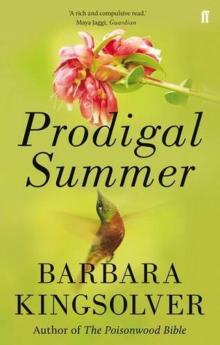 Prodigal Summer: A Novel
Prodigal Summer: A Novel Animal Dreams: A Novel
Animal Dreams: A Novel The Poisonwood Bible
The Poisonwood Bible High Tide in Tucson
High Tide in Tucson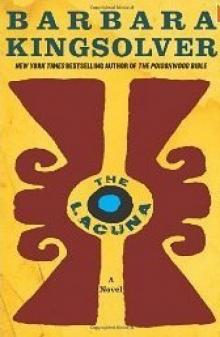 The Lacuna
The Lacuna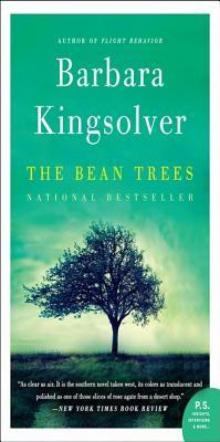 The Bean Trees
The Bean Trees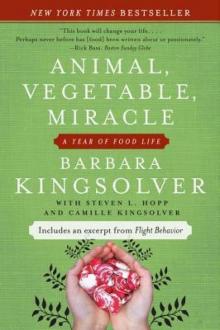 Animal, Vegetable, Miracle: A Year of Food Life
Animal, Vegetable, Miracle: A Year of Food Life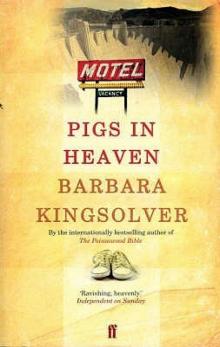 Pigs in Heaven
Pigs in Heaven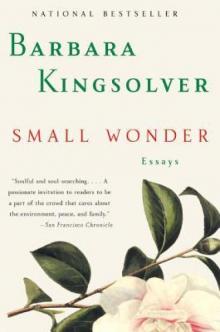 Small Wonder
Small Wonder Flight Behavior
Flight Behavior Homeland and Other Stories
Homeland and Other Stories How to Fly (In Ten Thousand Easy Lessons)
How to Fly (In Ten Thousand Easy Lessons) Unsheltered
Unsheltered Animal Dreams
Animal Dreams Prodigal Summer
Prodigal Summer Animal, Vegetable, Miracle
Animal, Vegetable, Miracle